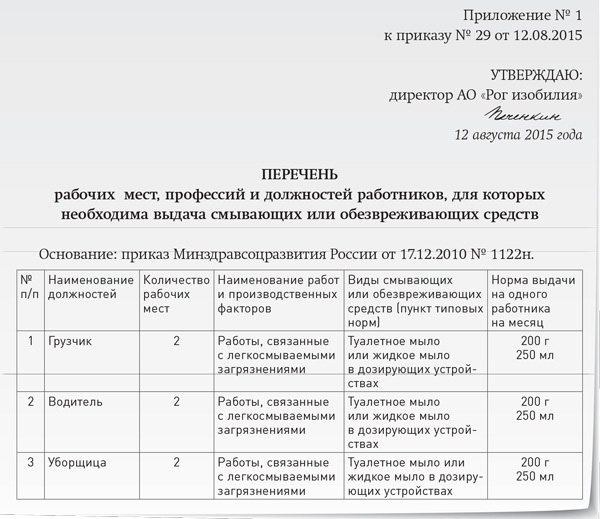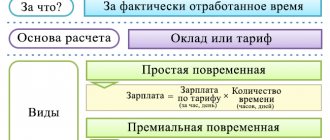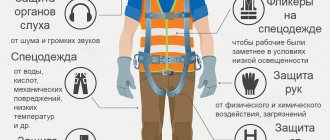Is it necessary to specify soap standards in an office worker’s employment contract?
Answer to the question:
Employers must purchase and issue at their own expense personal protective equipment, as well as flushing and neutralizing agents to employees performing work:
- with harmful or dangerous working conditions;
- in special temperature conditions;
- associated with pollution.
This is provided for in paragraph 7 of part 2 of article 212 and part 1 of article 221 of the Labor Code of the Russian Federation.
According to Appendix No. 2 to Order of the Ministry of Health and Social Development of Russia dated December 17, 2010 No. 1122n, the list of workplaces and the list of employees for whom the issuance of flushing and (or) neutralizing agents is necessary are compiled by the labor protection service (occupational safety specialist) or other authorized structural unit (official) of the employer and approved by the employer taking into account the opinion of the elected body of the primary trade union organization or other representative body authorized by the employees.
The specified list of jobs and the list of workers are formed on the basis of the Standard Standards and in accordance with the results of a special assessment of working conditions, taking into account the features of the existing technological process and labor organization, the raw materials used.
Before the employer receives the results of a special assessment of working conditions, or if the employer does not have them, a list of workplaces and a list of employees for whom the issuance of flushing and (or) neutralizing agents is necessary is formed taking into account the opinion of the elected body of the primary trade union organization or another representative body authorized by employees based on the Model Standards.
At the same time, in work involving easily washed-off contaminants, the employer has the right not to directly issue flushing agents to the employee, but to ensure the constant availability of soap or dispensers with liquid flushing agent in sanitary premises (clause 20 of the Occupational Safety Standard, approved by order of the Ministry of Health and Social Development of Russia dated December 17, 2010 No. 1122n). This means that the standards for issuing detergents do not have to be specified in the employment contract of such an employee. However, failure to specify the standard for dispensing detergents in the employment contract may lead to certain problems for the employer, since:
In other words, the employer must limit the list of employees to whom free flushing agents are provided. And when detergents are placed in public sanitary premises, the meaning of such a restriction is lost.
Thus, the standards for issuing flushing agents must be specified in the employment contracts of all employees performing the relevant types of work in accordance with the Occupational Safety Standard, approved by Order of the Ministry of Health and Social Development of Russia dated December 17, 2010 No. 1122n.
But this is only what concerns PPE.
We note that in accordance with the provisions of Art. 163 of the Labor Code of the Russian Federation, the employer is obliged to provide normal conditions for employees to fulfill production standards. Such conditions, in particular, include working conditions that meet labor protection and production safety requirements.
The concept of working conditions is established by the provisions of Art. 209 Labor Code of the Russian Federation. Thus, working conditions should be understood as a set of factors in the working environment and the labor process that influence the performance and health of the employee.
Also in accordance with the provisions of Art. 22 of the Labor Code of the Russian Federation, the employer is obliged, in particular, to provide for the everyday needs of employees related to the performance of their labor duties. According to Art. 223 of the Labor Code of the Russian Federation, the employer is responsible for providing sanitary, medical and preventive services to employees of organizations in accordance with labor protection requirements.
Thus, the employer in this case is not obliged to issue soap (and fix the issuance standards in employment contracts) within the framework of Order of the Ministry of Health and Social Development of Russia dated December 17, 2010 N 1122n and based on the results of a special assessment, but within the framework of providing for the everyday needs of its employees (including , office) the necessary supplies must be available (including soap).
This condition can be fixed separately in the collective agreement of the organization.
Thus, you need to create a List of workplaces and a list of employees for whom the issuance of flushing and (or) neutralizing agents is required; they are formed taking into account the opinion of the elected body of the primary trade union organization or another representative body authorized by employees on the basis of the Model Standards (before conducting a special assessment). For those employees who are not included in the List, conditions for the issuance of PPE do not need to be included in their employment contracts.
An additional agreement might look like this:
ADDITIONAL AGREEMENT No. 1 to the employment contract dated January 18, 2010 No. 7
| Moscow | 22.03.2013 |
“Alpha”, hereinafter referred to as the “Employer”, represented by the director Lvov Alexander Vladimirovich, acting on the basis of the charter, on the one hand, and the cleaner Dezhneva Anna Vasilyevna, hereinafter referred to as the “Employee”, on the other hand, agreed to include in the employment contract dated January 18 2010 No. 7 the following changes:
2.2. The employer, at his own expense, provides the employee with special clothing and footwear in accordance with the Standard Standards, approved. Order of the Ministry of Labor of Russia dated 08/02/2013 N 341n (as amended on 02/20/2014) “On approval of the Standard Standards for the free issuance of special clothing, special footwear and other personal protective equipment to workers of existing and under construction mines, open pit mines and organizations of the coal and shale industry employed in work with harmful and (or) dangerous working conditions, as well as those performed in special temperature conditions or associated with pollution":
| Name of the profession and/or position of the employee | Name of personal protective equipment | Issue rate per year (number of units or sets) |
| industrial and office cleaner | Suit for protection against general industrial pollution and mechanical impacts | 1 |
| and a trouser belt | before wear | |
| or mixed fabric robe | 2 | |
| Rubberized apron or apron made of polymer materials | 2 | |
| Leather boots with a hard toe cap or | 1 pair | |
| Leather low shoes or | 1 pair | |
| rubber ankle boots | Two pairs | |
| Cotton foot wraps or | 12 pairs | |
| cotton socks | 12 pairs | |
| Cotton gloves with polymer coating | 12 pairs | |
| Rubber gloves or gloves made of polymer materials | 6 pairs | |
| Cotton shirt | 2 | |
| Jacket made of mixed fabrics with insulating lining | 1 for 2 years | |
| Towel | before wear |
The employer provides the employee with flushing and (or) neutralizing agents on a monthly basis at his own expense. Flushing and (or) neutralizing agents are provided to employees in accordance with the standard standards for the free provision of flushing and (or) neutralizing agents to employees in accordance with Appendix No. 1 to Order of the Ministry of Health and Social Development of Russia dated December 17, 2010 N 1122n:
| Types of flushing and (or) neutralizing agents | Name of work and harmful factors | Issue rates per 1 employee for 1 month |
| Protective means | ||
| Combined action agents | Work under alternating exposure to water-soluble and water-insoluble materials and substances specified in paragraphs 1 and 2 of the Standard Standards | 100 ml. |
| Means for protection against bacteriologically harmful factors (disinfectants) | Working with bacterially hazardous environments | 100 ml. |
| 2 Cleansers | ||
| Soap or liquid detergent | Work related to easily washed off contaminants For body wash | 200 g (toilet soap) or 250 ml. (liquid detergent) 300 g toilet soap or 500 ml. liquid detergent |
| III. Regenerating, restorative agents | ||
| Regenerating restorative creams, emulsions | Work with organic solvents, various types of dust, including paper, disinfectants, work performed with rubber gloves | 100 ml. |
P. 2.3. The employer provides, at his own expense, washing and cleaning of the special clothing and shoes issued to the employee for use.
Section 3.8. The employee undertakes to treat the special clothing provided to him with care and to rationally use flushing, neutralizing and protective substances.
If you are dismissed before the end of the period for which special clothing and shoes were issued, return the previously issued special clothing. clothing and footwear to the employer or reimburse its residual value according to accounting data.
2. All other terms of the employment contract dated January 18, 2010 No. 7 are considered unchanged and binding on the parties.
3. This additional agreement is drawn up in two copies, one copy each for the Employee and the Employer, and comes into force on March 22, 2013. Both copies have equal legal force.
Signatures of the parties:
| Employer: "Alpha" Address: 125008, Moscow, st. Mikhalkovskaya, 20 TIN 7708123459, KPP 770801001 r/s 40702810400000001119 in Branch 3 of the Moscow State Technical University of the Bank of Russia BIC 044599000 | Worker: Dezhneva Anna Vasilievna passport series 46 02 No. 545177 issued by the Internal Affairs Directorate of the Voskresensky district of the Moscow region. 04/15/2002 Registration address: 125373, Moscow, blvd. Yana Rainisa, 24, bldg. 2, apt. 474 |
| _____________ A.V. Lviv | _____________ A.V. Dezhneva |
| A copy of the additional agreement has been received | A.V. Dezhneva |
Details in the materials of the Personnel System:
1. Situation: Is it necessary to indicate in employment contracts with employees the norms for issuing flushing or neutralizing agents (about “soap”)
Yes, it is necessary, but only in the employment contracts of employees engaged in the relevant types of work.
Employers must purchase and issue at their own expense personal protective equipment, as well as flushing and neutralizing agents to employees performing work:
This is provided for in paragraph 7 of part 2 of article 212 and part 1 of article 221 of the Labor Code of the Russian Federation.
Flushing and neutralizing agents are issued to employees in accordance with the Occupational Safety Standard approved by Order of the Ministry of Health and Social Development of Russia dated December 17, 2010 No. 1122n. The specified Occupational Safety Standard applies to all employers, regardless of their organizational and legal form and form of ownership (clause 2 of the Occupational Safety Standard, approved by Order of the Ministry of Health and Social Development of Russia dated December 17, 2010 No. 1122n). Specific standards for the issuance of flushing and neutralizing agents that correspond to the working conditions at the employee’s workplace must be specified in his employment contract (clause 9 of the Labor Safety Standard, approved by order of the Ministry of Health and Social Development of Russia dated December 17, 2010 No. 1122n).
At the same time, in work involving easily washed-off contaminants, the employer has the right not to directly issue flushing agents to the employee, but to ensure the constant availability of soap or dispensers with liquid flushing agent in sanitary premises (clause 20 of the Occupational Safety Standard, approved by order of the Ministry of Health and Social Development of Russia dated December 17, 2010 No. 1122n). This means that the standards for issuing detergents do not have to be specified in the employment contract of such an employee. However, failure to specify the standard for dispensing detergents in the employment contract may lead to certain problems for the employer, since:
- the concept of “work related to easily washed off contaminants” is not enshrined in law;
- the employer must organize proper accounting and control over the issuance of flushing and neutralizing agents to employees and record their issuance in a personal record card for the issuance of flushing and neutralizing agents under the employee’s signature (clause 24 of the Occupational Safety Standard, approved by order of the Ministry of Health and Social Development of Russia dated December 17, 2010 No. 1122n ).
- Add clauses 2.2., 2.3., 3.8 to the Employment Agreement. the following content:
- with harmful or dangerous working conditions;
- in special temperature conditions;
- associated with pollution.
In other words, the employer must limit the list of employees to whom free flushing agents are provided. And when detergents are placed in public sanitary premises, the meaning of such a restriction is lost.
Thus, the standards for issuing flushing agents must be specified in the employment contracts of all employees performing the relevant types of work in accordance with the Occupational Safety Standard, approved by Order of the Ministry of Health and Social Development of Russia dated December 17, 2010 No. 1122n.
From the answer “How to create a standard employment contract template for an organization”
Ivan Shklovets,
Deputy Head of the Federal Service for Labor and Employment
How to prescribe the norm for issuing soap to an employee in an employment contract
Representatives of labor inspectorates recognize the absence of standards for the provision of soap in employment contracts with employees as a violation.
Attention! You are on a professional website for employment lawyers and HR specialists. Registration may be required to read this article.
In Section 10 of the Labor Code, which is devoted to labor protection, Article 212 contains a condition that the employer is obliged to provide personal protective equipment, including the purchase and distribution of flushing and disinfecting agents at his own expense.
The employer is obliged to ensure the acquisition and issuance at his own expense <…> of flushing and neutralizing agents (paragraph 7, part 2, article 212 of the Labor Code of the Russian Federation).
The same article states that flushing agents are required for workers engaged in work with harmful or dangerous working conditions, and in work performed in special temperature conditions or associated with pollution. The company includes a soap clause in the employment contract.
More details on how to provide workers with detergents are specified in the Occupational Safety Standard “Providing workers with flushing and (or) neutralizing agents” Order of the Ministry of Health and Social Development of Russia dated December 17, 2010 No. 1122n. It is this document that GIT inspectors refer to when they impose fines on companies.
New items 2021
Starting from June 12, 2021, the rules for providing workers with special equipment have changed. Important changes in the distribution of soap and detergents in 2021 affected the following aspects (Order of the Ministry of Labor of Russia dated November 23, 2017 No. 805n):
- it is possible to indicate the norms for issuing flushing and neutralizing agents to an employee not only in the employment contract, but also in the corresponding local act of the enterprise;
- The employee can be notified of the funds due to him either in writing on paper or electronically. The main condition is the ability for the organization to prove that the employee is familiar with the issuing standards;
- organizations that work with easily washable contaminants may not record the dispensing of soap and liquid detergents in a personal card.
How to write down a condition regarding the standard for issuing soap in an employment contract
In contracts with employees who fall under the terms of the Labor Code, you can use the following wording about soap and detergents:
“The Employer undertakes to provide the Employee free of charge with the required amount of the following flushing and (or) neutralizing substances:
— _____ ml ___________;
— _____ ml ____________;
- _____ ml ____________.”
If the employee who is entitled to soap and detergents has been working for a long time, and there is no such provision in the employment contract, an additional agreement to the employment contract must be concluded.
Employees who are engaged in work involving difficult to wash off or persistent stains, in addition to toilet or liquid soap, must be directly provided with cleansing creams, gels and pastes (clause 21 of the Standard).
In addition, in order to purchase, issue and write off soap and other cleaning products, the employer must formalize:
- List of workplaces and list of employees for whom the issuance of flushing and neutralizing agents is required. The list is formed on the basis of standard standards (Appendix No. 1 to Order No. 1122n) and the results of a special assessment of working conditions.
- Order on approval of standards for the free distribution of flushing and neutralizing agents to employees.
- Personal cards for recording the issuance of flushing and neutralizing agents (see sample). There is no need to keep records of soap distribution if the employer does not issue soap directly to employees, but ensures the availability of soap in sanitary premises.
Organization of accounting for the issuance of soap and disinfectants
If a company organizes the accounting of dermatological personal protective equipment on its own, it is necessary to take into account the norms of current legislation and the following circumstances:
- Order No. 805n abolished the obligation of managers to record the distribution of soap to employees in personal accounting cards in cases where employees are engaged in work with easily washable contaminants.
- In accounting, soap and other similar products are inventories and are subject to accounting according to established inventory accounting standards, without any special features.
- A sample of a personal soap accounting card can be found in the appendix to Order No. 1122n.
- The company must approve a list of professions whose employees should receive soap and disinfectants. The list can be drawn up by order as an annex to the collective agreement.
- It makes sense to develop a standard for issuing personal protective equipment for production areas and approve standards for controlling consumption in the company's divisions. On the back of the document there should be a list of soap dispensed to the site - the signature of the responsible person will be affixed here.
When the soap clause may not be included in an employment contract
The Labor Code specifies “pollution” without any clarification, and in the order of the Ministry of Health and Social Development, officials use the term “at work involving easily washed off pollution.”
“Washing agents are required for workers engaged in work with harmful and (or) dangerous working conditions. For work performed in special temperature conditions or associated with pollution (paragraph 7, part 2, article 212 of the Labor Code of the Russian Federation)."
“For work involving easily washed off contaminants, cleaning agents are provided in the form of solid toilet soap or liquid detergents.
... also in work involving easily washed-off contaminants, the employer has the right not to directly issue flushing agents to the employee, but ensures the constant availability of soap or dispensers with liquid flushing agents in sanitary premises (clause 20 of the Occupational Safety Standard “Providing workers with flushing agents and/or ) neutralizing agents" Order of the Ministry of Health and Social Development of Russia dated December 17, 2010 No. 1122n)".
Formally, it turns out that any employers must prescribe the rules for issuing soap in employment contracts with employees. After all, this standard applies to all employers, regardless of their legal form.
They do not write about the provision of soap in the employment contract with an office worker
The Ministry of Labor clarified the issue of the standard for issuing soap in the employment contract with office workers. According to officials of the Ministry of Labor, easily washable pollution includes pollution in which the use of soap or liquid detergents is sufficient to cleanse the pollution during work. (letter of the Ministry of Labor of Russia dated May 6, 2016 No. 15-2/OOG-1752). That is, an employee must get dirty in the process of work in order to be able to clean something. This is unlikely to be an office employee. In the same letter, the Ministry of Labor wrote that for office employees (lawyer, accountant, economist, etc.) the issuance of cleaning agents and disinfectants in accordance with the order is not required.
With office workers (work involving easily washable contaminants), the employer may not specify specific standards for the issuance of soap in the employment contract, but ensure the constant availability of soap or dispensers with liquid detergent in sanitary premises (clause 20 of the Occupational Safety Standard, approved by order of the Ministry of Health and Social Development Russia dated December 17, 2010 No. 1122n). If we are talking about office workers, and not about employees who actually work in some specific conditions, there is no need to write about soap in the employment contract.
Read on the topic
- Occupational safety and health in the office. Five mistakes for which GIT fines
- Special assessment of working conditions. How labor safety standards are interpreted by the courts
- Old guarantees for “harmful” companies need to be retained if the company has not carried out a special assessment
- Employment contract with a pest worker. Four conditions that cannot be circumvented
- The company is changing working conditions. What will confirm the presence of organizational or technological changes
Watch the video lecture
Stress audit before inspection. What to do before the inspector's visit
| Only in April | |
| We give an apartment for a subscription to the magazine “Labor Disputes”. And also home renovations, travel and 25 gifts every week. | |
Major milestones
Compliance with the rules for issuing detergents is mandatory for all employers (clause 2 of the Standard). Moreover, all issued special equipment must be certified and have a declaration of conformity (clause 8 of the Standard).
It is necessary to select the tools necessary for the employee, guided by the results of a special assessment of working conditions (clause 12 of the Standard). However, when an employee performs work specified in the Standard Standards, cleaning and disinfecting agents must be issued to him, regardless of the results of a special assessment of the conditions in which the employee works.
Officials of the Ministry of Labor point to this norm, emphasizing that reducing the standards for issuing special equipment to employees is unacceptable (letter of the Ministry of Labor dated April 29, 2016 No. 15-2/OOG-1698).
Employees who work part-time (part-time or part-time) are provided with soap and detergents, just like other employees performing work for which free special equipment is provided.
However, detergents must be distributed in proportion to the employee’s workload. For example, if an employee is employed part-time, then he needs to be given only half of the special equipment required for this profession (letter of the Ministry of Labor dated September 29, 2016 No. 15-2/OOG-3452).
Standard standards for the free distribution of flushing and (or) neutralizing agents to employees (fragment)
| N p/p | Types of rinsing or disinfecting agents | Name of work and production factors | Issue rate per employee per month |
| Cleansers | |||
Soap or liquid detergents, including:
| Work related to easily washed off contaminants | 200 g of toilet soap or 250 ml of liquid soap in dispensing devices | |
| 300 g of toilet soap or 500 ml of liquid soap in dispensing devices | ||
| Solid toilet soap or liquid detergents | Work involving hard-to-remove, persistent contaminants (oils, greases, petroleum products, varnishes, paints, resins, adhesives, bitumen, fuel oil, silicone, soot, graphite, various types of industrial dust, including coal and metal) | 300 g of toilet soap or 500 ml of liquid soap in dispensing devices | |
| Work in coal and shale mines, in open-cast mines, in processing and briquette factories, in mine construction and mine installation organizations in the coal industry | 800 g of toilet soap or 750 ml of liquid soap in dispensing devices | ||
| Cleansing creams, gels and pastes | Work involving hard-to-remove, persistent contaminants (oils, greases, petroleum products, varnishes, paints, resins, adhesives, bitumen, fuel oil, silicone, soot, graphite, various types of industrial dust, including coal and metal) | 200 ml |
Clause 7 of the Model Standards mentions work involving easily washable contaminants. What exactly is considered such work? This is not explained either by the Model Norms themselves or by the Standard.
During inspections, labor inspectors insist that employment contracts with secretaries, lawyers, managers and other office workers must specify the standards for issuing them toilet or liquid soap. Accountants and personnel officers write about this on forums.
The concept of “work associated with easily washed off contaminants” is disclosed in the Order of JSC Russian Railways dated December 17, 2012 N 2587r. Although this document is a local regulatory act of Russian Railways, we will use it to clarify the situation.
So, easily washed off pollutants include, in particular:
- organic solvents;
- various types of industrial dust (wood, siliceous, etc.);
- fiberglass;
- cement, lime;
- disinfectants;
- acids, alkalis, salts, etc.
As you can see, the list of easily washable pollutants is quite specific. It is unlikely that the work duties of a secretary or accountant are associated with such harmful production factors.
Ministry of Labor and Social Development of the Krasnodar Territory
N 1122n, which approved:
- Appendix No. 1: “Standard standards for the free distribution of flushing and (or) neutralizing agents to employees.”
Thus, in case of light contamination, each employee is entitled to 200 g of solid soap or 250 ml of liquid soap in a hand dispenser, 300 g of solid soap and 500 ml of liquid soap for the body. When working with persistent contaminants (lubricants, paints, glue, abrasive dust and other substances that are difficult to wash off), the soap standards are the same, but special detergent pastes, gels and creams are added to them. The highest consumption of flushing agents is established for coal industry enterprises: 800 g of ordinary toilet soap or 750 ml of liquid soap in a dispenser.
- Appendix No. 2: Occupational safety standard “Providing workers with flushing and (or) neutralizing agents.”
It is here, in paragraph 9, that the above-mentioned norms must be specified in the employment contract.
Paragraph 20 of the Standard clarifies that when working with easily washable contaminants, the employer does not have to provide soap supplies to each employee personally. It is enough to constantly replenish the supply of soap, gels, etc. in sanitary premises.
For verification you will certainly need:
- a list of workplaces and a list of workers who need detergents;
- local order on soap distribution standards;
- personal account cards;
- employment contracts with the corresponding entry.
If the additional terms of the employment contract do not contain a clause on the norms for issuing flushing agents, administrative liability may follow precisely for its improper execution. This means that an official will have to pay from 10 to 20 thousand rubles, an individual entrepreneur from 5 to 10 thousand rubles, and a legal entity from 50 to 100 thousand rubles.
These requirements apply to production facilities with harmful and dangerous working conditions; managers of industrial enterprises should definitely check local documentation with current regulations on labor protection. There is no need to prescribe standards for the issuance of soap when registering labor relations with office employees.
For whom entries in employment contracts about soap are required
According to the author, records about the standards for issuing soap are necessary in employment contracts with employees engaged in the following works:
- with harmful and (or) dangerous working conditions;
- in special temperature conditions;
- associated with pollution.
Purchasing soap for toilets used by non-polluting professions (accountants, secretaries, lawyers, etc.) has a different explanation.
The company is obliged to provide sanitary services for employees (paragraph 18, part 2, article 212 and part 1, article 223 of the Labor Code of the Russian Federation).
The Labor Code does not oblige the employer to stipulate in the employment contract with employees all the nuances of their sanitary and household services.
It is possible that inspectors from the labor inspectorate will not agree with this approach. If you want to protect yourself 100%, use the recommendations for issuing flushing or neutralizing agents to employees for whom this is mandatory.
>What documents need to be completed in connection with the mandatory provision of soap to employees?
To purchase, issue, use and write off soap, a number of documents must be completed.
How to familiarize employees with soap dispensing standards
All employees of the enterprise must be promptly notified of the organization’s standards for issuing soap and other protective or flushing agents. This can be done in several ways. The simplest thing is to include the relevant clauses in the employment contract.
If you were not familiarized with the standards when you were hired, this must be done as soon as possible by mail or in person. The main condition is the ability to confirm that the employee has been familiarized with the standards. Therefore, his signature must be affixed to all relevant documents.
When issuing funds, all employees must be familiarized with the rules for their use.
Flushing and neutralizing agents in an employment contract
In order to comply with all established labor safety standards, it is advisable for the employer to include information about the standards for issuing flushing agents already at the stage of developing the employment contract.
In this case, a simple reference to the organization's normative act may not be enough. It is necessary to familiarize the employee with a specific list of everything that will be provided to him to ensure normal working conditions. This is especially true for activities associated with increased pollution and health risks.
Important! It is in the interests of the enterprise to prescribe the standards for issuing hygiene products in the employment contract - already at the stage of familiarization with the vacancy, the employee will see that they are worried about him.
Order on approval of standards for the free distribution of flushing and neutralizing agents to employees
—————————————————————————¬ ¦ Joint Stock Company “Cornucopia” ¦ ¦ (JSC “Cornucopia”) ¦ ¦ —————— —————————————————— ¦ ¦ ¦ ¦ ORDER N 29 ¦ ¦ on approval of standards for free distribution to employees of ¦ ¦ flushing and neutralizing agents ¦ ¦ ¦ ¦ g. Orel August 12, 2015¦ ¦ ¦ ¦ In order to improve the protection of workers from pollution existing in the workplace¦ ¦ in accordance with Part 2 of Art. 221 of the Labor Code of the Russian Federation and Order of the Ministry of Health and Social Development of Russia dated December 17, 2010 N 1122н ¦ ¦ ¦ ¦ I ORDER: ¦ ¦ 1. To approve the standards for the free distribution of flushing and neutralizing agents to employees in accordance with Appendix 1 to this order. ¦ ¦ 2. Head of the HR Department V.A. Poshekhonova by August 17, 2015: ¦ 2.1. Familiarize employees with this order with the provision of free distribution of flushing and neutralizing agents. ¦ ¦ 2.2. Prepare draft supplementary agreements to the labor contracts of employees, who are provided with free distribution of cleaning agents and disinfectants. ¦ ¦ 3. Responsibility for issuing detergents should be assigned to the head of the labor protection department, R.I. Vorotilov. ¦ ¦ 4. I reserve control over the execution of the order. ¦ ¦ ¦ ¦Director Pechenkin Z.G. Pechenkin ¦ ¦ ¦ ¦The order has been reviewed by: ¦ ¦ ¦ ¦Head of the HR Department Poshekhonova V.A. Poshekhonova ¦ ¦ August 12, 2015¦ L—————————————————————————— >Soap dispensing registration card
The employer is required to keep records and control over the issuance of flushing and neutralizing agents to employees (sample 3 on p. 97).
Sample 3
Order for issuing detergents: sample
Sample order for standards for issuing workwear
Each employer must keep records of the distribution of flushing and protective equipment. Such accounting is carried out using personal cards of workers. They indicate the employee’s name, position, as well as a list of items issued. In most cases, such cards are quite enough. There is no need to draw up a special order for extradition.
However, if necessary, such an order can be drawn up. It indicates the list of employees to whom the issuance is carried out, as well as all funds. The order is signed by the manager or responsible person. The employees themselves do not have to sign for it.

Sample order for extradition
Additional agreement to the employment contract (fragment)
—————————————————————————¬ ¦ ADDITIONAL AGREEMENT N 2 ¦ ¦ TO EMPLOYMENT AGREEMENT N 32/14-td dated 04/17/2014 ¦ ¦ ¦ ¦ G. Orel August 18, 2015¦ ¦ ¦ ¦ Joint Stock Company “Cornucopia”, hereinafter referred to as ¦ ¦ “Employer”, represented by director Pechenkin Zinovy Georgievich, ¦ ¦acting on the basis of the Charter, on the one hand, and Novikova Valeria ¦ Alexandrovna , hereinafter referred to as “Employee”, on the other hand, “have entered into this additional agreement to the employment contract” ¦N 32/14-td dated 04/17/2014 on the following. ¦ ¦ Section 5 of the employment contract “Rights and obligations of the employee” shall be supplemented¦ ¦p. 5.4: ¦ ¦ “In order to improve the protection of workers from pollution existing in the workplace” in accordance with Part 2 of Art. 221 of the Labor Code of the Russian Federation and Order of the Ministry of Health and Social Development of Russia dated December 17, 2010 N 1122n. “The employee is given flushing and (or) neutralizing agents once a month - 200 g of toilet soap or 250 ml of liquid soap in dispensing devices.” . ¦ ¦ Changes to the employment contract, determined by this additional agreement, come into force on August 18, 2015. This additional agreement is an integral part of the employment contract, drawn up in two copies having the same legal force. One copy is kept by the Employer in the Employee’s personal file, the second by the Employee. ¦ ¦ <…> ¦ L—————————————————————————
12/01/2015 Keep your employment contract clean or how to avoid fines for soap
This year, the labor inspectorate has fined large companies more than once for a small error: the labor contracts of the working personnel did not stipulate the standards for issuing flushing agents.
Strictly speaking, in Article 57 of the current Labor Code there is not a word about specific standards for the distribution of soap. However, in their actions, inspectors refer to other norms of the Labor Code: in Art. 212 and 221 clearly state that the employer must, at his own expense, provide flushing and neutralizing agents to the staff.
In addition, the justification is the order of the Ministry of Health and Social Development dated December 17, 2010.









